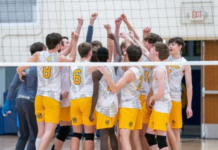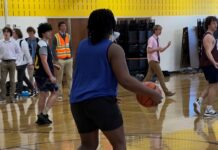by Brendan Mitchell ‘17
The Saint Ignatius swim team, which placed second in last year’s state meet, is dedicated to pushing onward in pursuit of another shot at a state title. This commitment to success is most obvious when it comes to their unusually grueling two-a-day Christmas break practice schedule, and the normal practices aren’t much easier. “We usually have two practices a day,” said senior member and state second-place finisher Nathan Christian. The senior says that even though swimmers get Sundays off, the other six days of the week incorporate around two hours in the water each day.
Christian admitted that the intense workload often drives away new recruits, although he believes that those who stick it out have the work ethic to succeed.“Swim practice is hard,” Christian said. “But if you make it through the first few weeks you’ll probably last through the rest of the season.” Practices at the elite level of the Saint Ignatius squad requires intense and meticulous attention to detail in order to perfect the minor stroke techniques that can make the difference between a first and last place finish in a packed state final. “There is a lot more yardage and stroke work,” said freshman member of the swim team, Marcus Hong, who has made the transition from club to school competition this year.
Senior member and co-captain of the swim team Abdo Dergham said that his grade school swim practices were “a lot easier and you could skip practice whenever you wanted and you could show up whenever you felt like it, whereas with Coach Ridler and Saint Ignatius you show up everyday, twice a day.” Twice a day means two weekly morning swim practices for sophomores and up at Cleveland State at 5:30 a.m., which usually requires the swimmers to wake up at 4:45 a.m. or earlier to arrive on time. There are also three weekly lifting sessions at Ignatius from 6:00 a.m. to 7:15 a.m., and another morning practice on Saturday at the team’s primary practice facility at the metropolitan campus of Cuyahoga Community College.
But even though the workload is intense, Dergham said that from a leader’s point of view, if he could change the the practice load, he wouldn’t. “Because with swimming, the more yardage you do, the better you’ll get, so the more we practice, the better we’ll be,” he said. Dergham said that other things his teammates could do to help them perform at their best would be to make sure to keep up on nutrition and drink often to avoid dehydration, which can result in painful mid-practice leg cramps. “The biggest problem,” Dergham said, “is that we practice at the Tri-C pool and the pool is really dirty and disgusting so we all get sick. This is the third week of the season and about 75% of the team is really sick.”
With the intense practice-load and the conditions that the swim team practices, a large portion of new recruits drop out. According to Dergham, the team fell from an initial group of 28 members to only 17 swimmers by the end of the season. He added that most of the drop outs were freshmen, and that if you made it past freshman year, you were most likely going to be on swim team as a senior. “You don’t get kicked off,” Dergham said. “If you leave, it’s you deciding to quit. So if you make through freshman year, it means you’re dedicated and you’re going to stick around for the remaining three years.”






